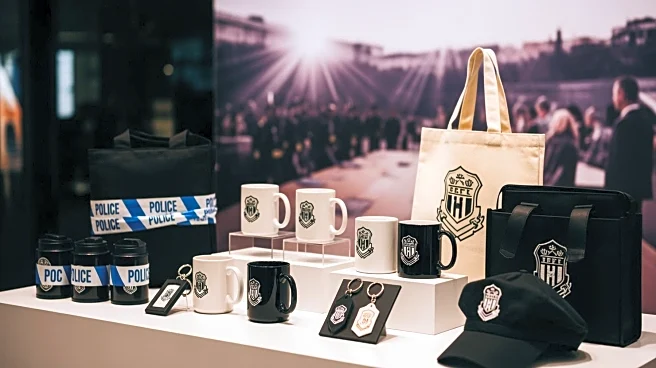What's Happening?
Convenience stores across the U.S. are increasingly turning to branded merchandise as a strategic marketing tool. Retailers like Buc-ee’s, Fat Dogs, and Kwik Trip are capitalizing on their iconic logos
and slogans to create a variety of branded items, ranging from apparel to novelty products. This approach not only generates additional revenue but also serves as a form of viral advertising, as customers wear and use these items, spreading brand awareness far beyond the store's physical location. For instance, Fat Dogs has implemented a 'just-in-time inventory' system to efficiently manage its merchandise, ensuring that popular items are readily available. Similarly, Kwik Trip has launched a proprietary merchandise program, testing its viability across select stores. These initiatives reflect a broader trend among convenience retailers to enhance customer engagement and loyalty through creative branding strategies.
Why It's Important?
The move towards branded merchandise represents a significant shift in how convenience stores engage with their customers. By offering products that carry the store's brand, retailers can foster a deeper connection with their clientele, turning everyday items into marketing tools. This strategy not only boosts sales but also enhances brand visibility and customer loyalty. As customers use these branded items, they inadvertently become ambassadors for the store, promoting its image and values. This approach is particularly beneficial for smaller chains looking to compete with larger retailers by creating a unique identity that resonates with consumers. Additionally, the integration of branded merchandise into ecommerce platforms allows stores to reach a wider audience, further amplifying their marketing efforts.
What's Next?
As convenience stores continue to explore the potential of branded merchandise, we can expect to see more innovative products and marketing strategies emerge. Retailers may expand their offerings to include exclusive collaborations with local artists or businesses, creating limited-edition items that appeal to niche markets. The success of these initiatives will likely lead to increased investment in ecommerce capabilities, allowing stores to reach customers beyond their immediate geographic area. Furthermore, the data collected from merchandise sales can provide valuable insights into consumer preferences, enabling retailers to tailor their product offerings more effectively. As the testing phase progresses, stores like Kwik Trip will assess the viability of making their merchandise program a permanent fixture, potentially setting a precedent for other retailers to follow.
Beyond the Headlines
The rise of branded merchandise in convenience stores also highlights broader cultural and economic trends. As consumers increasingly seek personalized and unique products, retailers are adapting by offering items that reflect their brand's identity and values. This shift towards experiential and lifestyle branding aligns with the growing demand for authenticity and community connection in retail. Moreover, the success of these initiatives underscores the importance of strategic partnerships and collaborations, as seen with Fat Dogs' co-branding efforts with local distillers. These partnerships not only enhance the store's product offerings but also strengthen its ties to the local community, fostering a sense of belonging and loyalty among customers.








